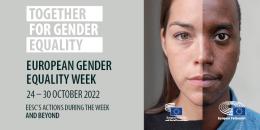European Economic
and Social Committee
Ensuring that the implementation, monitoring and evaluation of the national Recovery and Resilience Plans adopt a gender perspective is now crucial
The EESC held a debate on gender-based investments in the Member States' national Recovery and Resilience Plans (RRPs). Following on from the European Gender Equality Week, the event gathered policy-makers, experts from organised civil society and academia to discuss, among other things, how EU countries can improve the impact of the measures proposed in their RRPs on gender equality during implementation and monitoring. The conclusions are an important contribution to the ongoing debate underlined by the EESC opinion "Gender-based investments in national Recovery and Resilience Plans", aimed to be adopted in December.
Improving tracking methodologies, systematically consulting relevant gender-equality actors when implementing the national RRPs, institutionalising gender mainstreaming at all levels and processes related to the national plans, applying a gender perspective when assessing the effectiveness of tax-benefit policies and using analytical tools to ensure that budget policy is more effective at meeting gender-equality objectives. These were some of the main takeaways of the day.
The COVID-19 crisis particularly impacted women's social and economic situation, aggravating pre-existing labour market disadvantages
, said EESC member Elena Calistru, opening the debate. The Recovery and Resilience Facility (RRF), as the EU's biggest financial instrument supporting recovery in Member States, is an opportunity for the economic empowerment of women.
To benefit from the RRF, countries have to submit national RRPs, where they explain how the funds will be used. The EU has made gender equality a prerequisite to these plans, and Member States are legally required to explain how they will integrate gender-based investments. However, as rapporteur Cinzia Del Rio underlined: if Member States are not ready and willing to collect the data now on the impact of their measures on gender equality, there will be no possibility to collect it afterwards. The absence of this data would deprive us of any possibility to know ex ante the impact of the RRPs on gender equality
.
Irene Rioboo, researcher at the European Institute for Gender Equality, explained that the lack of a sufficient tracking methodology in the RRF, and the fact that most Member States have not used gender budgeting tools, will prevent a systematic assessment and monitoring of the budget allocated to gender equality in the RRPs. Relevant gender equality actors should be systematically consulted, and gender mainstreaming should be institutionalised at all levels and processes related to RRPs
.
Iga Magda, from the Warsaw School of Economics, sees a positive evolution in the tools used to assess gender pay-gaps and inequalities. The major reason for the existence of the gender pay-gap is the segregation of women into lower paid professions. Awareness must be raised that gender inequality exists
. Ms Magda suggested providing more support for more equal sharing of unpaid work, addressing stereotype risks at an early age and considering gender-equality as affecting all dimensions of the recovery.
Sarah Perret is Head of Unit at the OECD Centre for Tax Policy and Administration. We need more focus on assessing the implicit gender biases in tax systems. Indeed, implicit gender biases are increasingly common in the OECD countries, and even if tax provisions are gender-blind, they will affect men and women differently (because of differences in the level and the nature of their income, differences in consumption, etc.). Therefore, gender-blind tax provisions end up being not gender-neutral
. Among other things, she highlighted the importance of gender budgeting and of using analytical tools to make sure that budget policy is more effective at meeting GE objectives.
Barbara Martini, from the University of Rome Tor Vergata, and Cristina Antoñanzas Peñalva, General Deputy Secretary of the Spanish General Union of Workers (UGT) were also present. Ms Martini stressed that the success of the RRPs' improvement of gender equality will depend on the implementation phase, while Ms Antoñanzas underlined that we need to increase the participation of social agents as well as establish dialogues with social stakeholders.
This debate was the first of a series organised by the EESC, supporting the European Parliament's Gender Equality Week initiative in October. Find the agenda here.

